外研版七下Unit2《Goldilockshurriedoutofthehouse1》word教案
- 格式:doc
- 大小:91.50 KB
- 文档页数:1
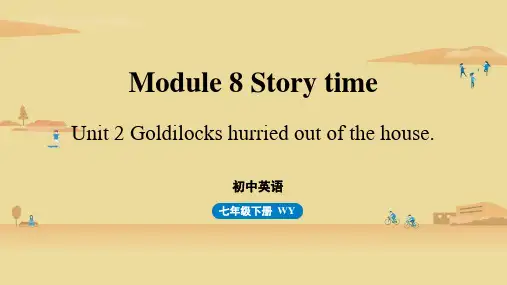
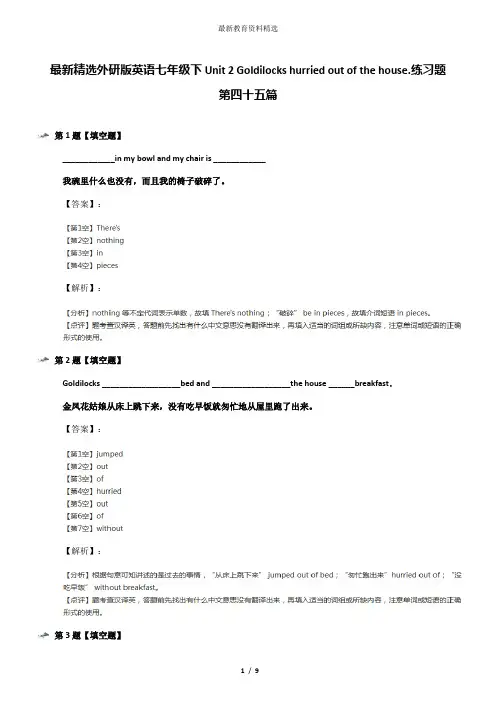
最新精选外研版英语七年级下Unit 2 Goldilocks hurried out of the house.练习题第四十五篇第1题【填空题】____________in my bowl and my chair is ____________我碗里什么也没有,而且我的椅子破碎了。
【答案】:【解析】:第2题【填空题】Goldilocks __________________bed and __________________the house ______breakfast.金凤花姑娘从床上跳下来,没有吃早饭就匆忙地从屋里跑了出来。
【答案】:【解析】:第3题【填空题】The fat man was very heavy and soon the chair was in ______(piece).【答案】:【解析】:第4题【填空题】They didn"t______Goldilocks ____________他们起初没有注意到金凤花姑娘。
【答案】:【解析】:第5题【填空题】My sister______(point)at me and cried loudly.【答案】:【解析】:第6题【填空题】My friend went to Beijing without ______(tell)me.【答案】:【解析】:第7题【填空题】不要用手指指着别人。
Don"t ____________others with your fingers.【答案】:【解析】:第8题【填空题】刚才你注意到那个小女孩了吗?______you ______that girl just now?【答案】:【解析】:第9题【句型转换】句型转换I did my homework at home yesterday evening. (改为否定句)______ ______ my homework at home yesterday evening.He played football this morning. (改为一般疑问句, 并作肯定回答) —______ he ______football this morning?—______, he______.Barry visited his uncle last week. (对画线部分提问)______ ______ Barry ______ last week?Tony left the house. He didn’t say any words. (合并为一句)Tony left the house ______ ______ any words.There was nobody in the room. (改为同义句)There ______ ______ in the room.【答案】:【解析】:第10题【翻译】英译汉in piecessit downbe asleephurry out of【答案】:【解析】:第11题【翻译】汉译英起初;首先指着……从……里跳出来走进【答案】:【解析】:第12题【选词填空(词汇运用)】I didn"t notice the animal on the ground______first.He looked______,but saw nothing.She hurried to school______breakfast this morning.My glasses fell down from the desk and was______pieces·The boy took something from the bed and ran______the bedroom.【答案】:【解析】:第13题【选词填空(词汇运用)】The cup is______.Let"s buy a new one.______, he worked on the farm near the city.He______the photo carefully but didn"t say anything.They are______ the hall.What"s happening in it?We"d like to ______to have a rest.【答案】:【解析】:第14题【选词填空(词汇运用)】I"m not a manager.He isn"t a manager______Jim was too tired and he was______soon.Listen!Who is______in the room?We can"t find the lost book the______students" help.It"s not easy to remember these important______of the book.【答案】:【解析】:第15题【语法填空】The policeman______(point)at the traffic lights and asked us to stop.【答案】:【解析】:。
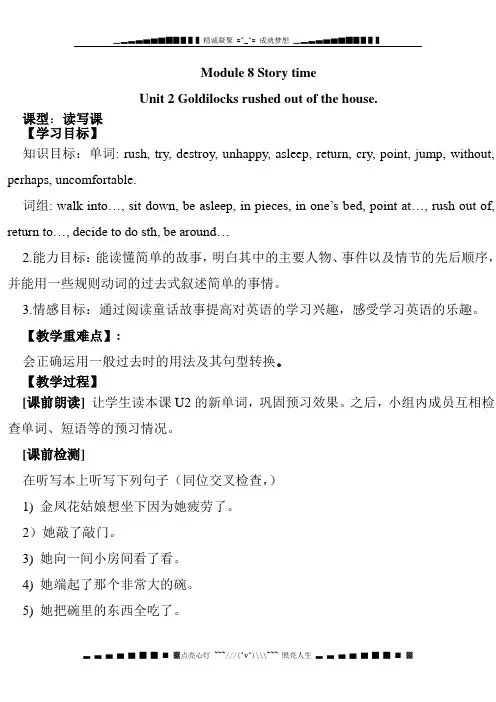
Module 8 Story timeUnit 2 Goldilocks rushed out of the house.课型:读写课【学习目标】知识目标:单词: rush, try, destroy, unhappy, asleep, return, cry, point, jump, without, perhaps, uncomfortable.词组: walk into…, sit down, be asleep, in pieces, in one’s bed, point at…, rush out of, return to…, decide to do sth, be around…2.能力目标:能读懂简单的故事,明白其中的主要人物、事件以及情节的先后顺序,并能用一些规则动词的过去式叙述简单的事情。
3.情感目标:通过阅读童话故事提高对英语的学习兴趣,感受学习英语的乐趣。
【教学重难点】:会正确运用一般过去时的用法及其句型转换。
【教学过程】[课前朗读]让学生读本课U2的新单词,巩固预习效果。
之后,小组内成员互相检查单词、短语等的预习情况。
[课前检测]在听写本上听写下列句子(同位交叉检查,)1) 金凤花姑娘想坐下因为她疲劳了。
2)她敲了敲门。
3) 她向一间小房间看了看。
4) 她端起了那个非常大的碗。
5) 她把碗里的东西全吃了。
一、情景导入利用Unit1中的图片,回忆第一单元故事内容,预测故事的发展,激活学生思维,由此导出Unit 2 . Goldilocks rushed out of the house.二、多层阅读1.泛读:快速阅读,完成Activity 3(要求:学生阅读时不能从头到尾、一字不漏地读下去,而是采用跳跃式的默读方法,搜寻相关信息,并对文章的内容有一个总体的了解)2.精读仔细默读文章,完成Activity 4.三、理解意思1.小组内合作解决课文的汉语意思,找出不懂的地方。
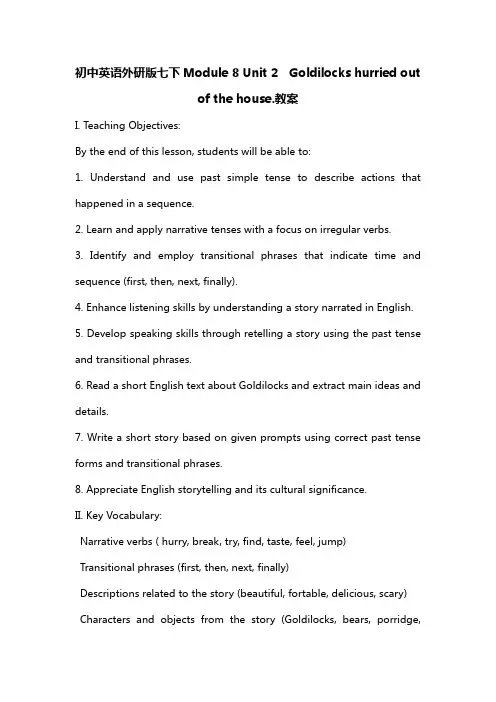
初中英语外研版七下Module 8 Unit 2 Goldilocks hurried outof the house.教案I. Teaching Objectives:By the end of this lesson, students will be able to:1. Understand and use past simple tense to describe actions that happened in a sequence.2. Learn and apply narrative tenses with a focus on irregular verbs.3. Identify and employ transitional phrases that indicate time and sequence (first, then, next, finally).4. Enhance listening skills by understanding a story narrated in English.5. Develop speaking skills through retelling a story using the past tense and transitional phrases.6. Read a short English text about Goldilocks and extract main ideas and details.7. Write a short story based on given prompts using correct past tense forms and transitional phrases.8. Appreciate English storytelling and its cultural significance.II. Key Vocabulary:Narrative verbs ( hurry, break, try, find, taste, feel, jump) Transitional phrases (first, then, next, finally)Descriptions related to the story (beautiful, fortable, delicious, scary) Characters and objects from the story (Goldilocks, bears, porridge,chairs, bed)III. Target Language Structures:Simple past tense, regular and irregular verbsUse of past tense to create a coherent narrativeSequencing adverbs to show the order of eventsUsing descriptive language to add detail to a storyIV. Teaching Aids:Pictures illustrating scenes from the story of Goldilocks and the Three Bears.Whiteboard and markers for writing key sentences and grammar points. Audio recording of the story or a video clip if available.Handouts with exercises on past tense, transitional phrases, and a guided storywriting template.V. Teaching Procedures:Step 1: Warmup (5 minutes)Start with an engaging activity where students share what they remember about the story of Goldilocks from their previous knowledge. Elicit key vocabulary and review it with the class.Step 2: Listening (10 minutes)Play an audio or video of the story and ask students to pay attention to the sequence of events.After listening/viewing, ask specific questions to check understandingof the story.Step 3: Speaking Practice (15 minutes)Students work in pairs to summarize the story using past tense verbs and transitional phrases.Conduct a class activity where students take turns retelling parts of the story using the new language.Step 4: Grammar Focus (10 minutes)Review regular and irregular past tense verbs through examples and correction practice.Introduce and practice sequencing adverbs with classroom participation.Step 5: Reading (10 minutes)Distribute the text about Goldilocks and guide students through it, focusing on identifying narrative verbs and transitional phrases used. Step 6: Writing Task (10 minutes)Hand out worksheets with a writing template and prompt students to write a short story using past tense and transitional phrases.Step 7: Homework & Review (5 minutes)Assign homework for students to create a similar short story at home, either individually or as a small group project.Review key points from the lesson through a quick quiz or verbal questioning.VI. Assessment:Evaluate students based on their participation in speaking activities, correct usage of past tense and transitional phrases in oral and written assignments, and pletion of homework tasks.Assess listening skills through prehension questions related to the story. Assess reading prehension through a short quiz targeting the main events and details of the text.Review the ability to organize events in a logical sequence using the learned transitional phrases.。
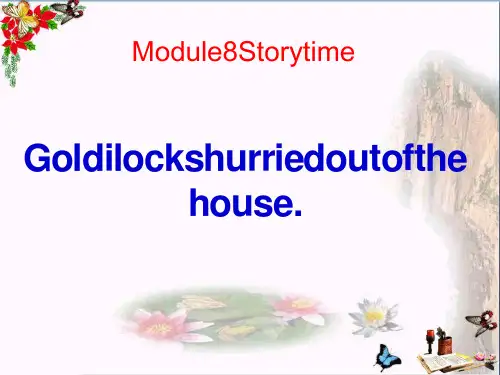
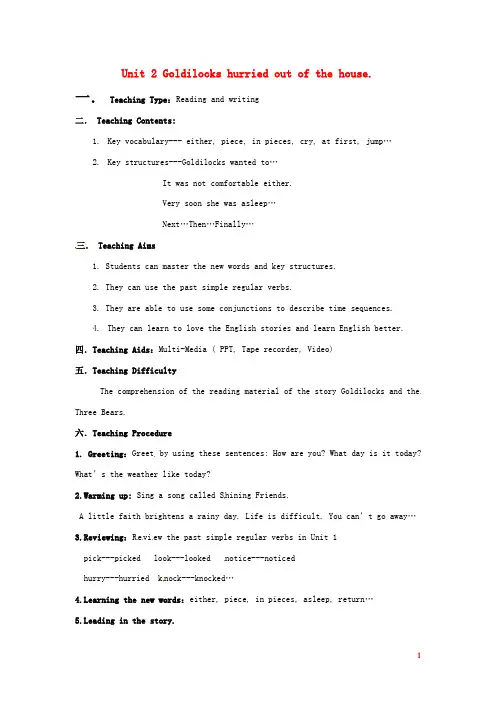
Unit 2 Goldilocks hurried out of the house. 一.Teaching Type:Reading and writing二.Teaching Contents:1.Key vocabulary--- either, piece, in pieces, cry, at first, jump…2.Key structures---Goldilocks wanted to…It was not comfortable either.Very soon she was asleep…Next…Then…Finally…三. Teaching Aims1. Students can master the new words and key structures.2. They can use the past simple regular verbs.3. They are able to use some conjunctions to describe time sequences.4.They can learn to love the English stories and learn English better. 四.Teaching Aids:Multi-Media ( PPT, Tape recorder, Video)五.Teaching DifficultyThe comprehension of the reading material of the story Goldilocks and the Three Bears.六.Teaching Procedure1. Greeting:Greet by using these sentences: How are you? What day is it today? What’s the weather like today?2.Warming up: Sing a song called Shining Friends.A little faith brightens a rainy day. Life is difficult. You can’t go away…3.Reviewing:Revi ew the past simple regular verbs in Unit 1pick---picked look---looked notice---noticedhurry---hurried k nock---knocked…4.Learning the new words:either, piece, in pieces, asleep, return…5.Leading in the story.1).Watch the first part of the video Goldilocks and the Three Bears.2).Ask the students to guess what will happen next.3).Discuss in groups and say what will happen next.6.Reading comprehension of the story1).Listen to the story once and finish Activity 2(Number the pictures in the correct order).2).Read the story fast and finish Activity 3(Match the sentences with the pictures).3).Read the story again and finish Activity 4(Check the true sentences).4).Work in groups and finish Activity 5.7. Reading the passage after the tape.8. Watching the rest of the video of the story Goldilocks and the Three Bears. And try to make an ending for the story.9. Educating the students to be more interested in English and learn it better by showing some pictures of the other English stories such as The Snow White and Th e Seven Dwarfs.10.Summing u p and homework:Read the story in Activity 2 again. Imagine what will happen next. Write at least three sentences.。
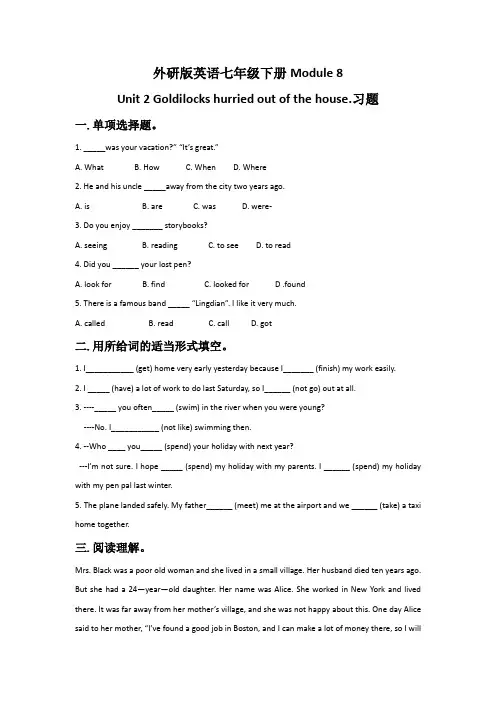
外研版英语七年级下册Module 8Unit 2 Goldilocks hurried out of the house.习题一.单项选择题。
1. _____was your vacation?”“It’s great.”A. WhatB. HowC. WhenD. Where2. He and his uncle _____away from the city two years ago.A. isB. areC. wasD. were-3. Do you enjoy _______ storybooks?A. seeingB. readingC. to seeD. to read4. Did you ______ your lost pen?A. look forB. findC. looked for D .found5. There is a famous band _____ “Lingdian”. I like it very much.A. calledB. readC. callD. got二.用所给词的适当形式填空。
1. I___________ (get) home very early yesterday because I_______ (finish) my work easily.2. I _____ (have) a lot of work to do last Saturday, so I______ (not go) out at all.3. ----_____ you often_____ (swim) in the river when you were young?----No. I___________ (not like) swimming then.4. --Who ____ you_____ (spend) your holiday with next year?---I’m not sure. I hope _____ (spend) my holiday with my parents. I ______ (spend) my holiday with my pen pal last winter.5. The plane landed safely. My father______ (meet) me at the airport and we ______ (take) a taxi home together.三.阅读理解。
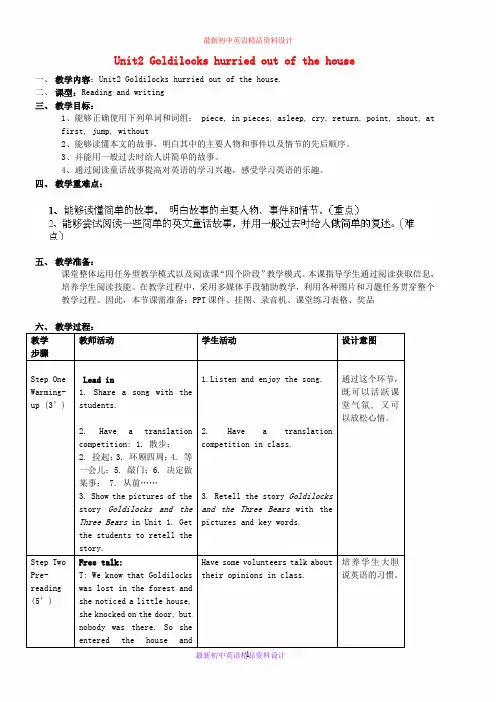
Unit2 Goldilocks hurried out of the house一、教学内容:Unit2 Goldilocks hurried out of the house.二、课型:Reading and writing三、教学目标:1、能够正确使用下列单词和词组: piece, in pieces, asleep, cry, return, point, shout, atfirst, jump, without2、能够读懂本文的故事,明白其中的主要人物和事件以及情节的先后顺序。
3、并能用一般过去时给人讲简单的故事。
4、通过阅读童话故事提高对英语的学习兴趣,感受学习英语的乐趣。
四、教学重难点:五、教学准备:课堂整体运用任务型教学模式以及阅读课“四个阶段”教学模式。
本课指导学生通过阅读获取信息,培养学生阅读技能。
在教学过程中,采用多媒体手段辅助教学,利用各种图片和习题任务贯穿整个教学过程。
因此,本节课需准备:PPT课件、挂图、录音机、课堂练习表格、奖品六、教学过程:教学步骤教师活动学生活动设计意图Step One Warming-up (3’)Lead in1. Share a song with thestudents.2. Have a translationcompetition: 1. 散步;2. 捡起;3. 环顾四周;4. 等一会儿;5. 敲门;6. 决定做某事; 7. 从前……3. Show the pictures of thestory Goldilocks and theThree Bears in Unit 1. Getthe students to retell thestory.1.Listen and enjoy the song.2. Have a translationcompetition in class.3. Retell the story Goldilocksand the Three Bears with thepictures and key words.通过这个环节,既可以活跃课堂气氛, 又可以放松心情。
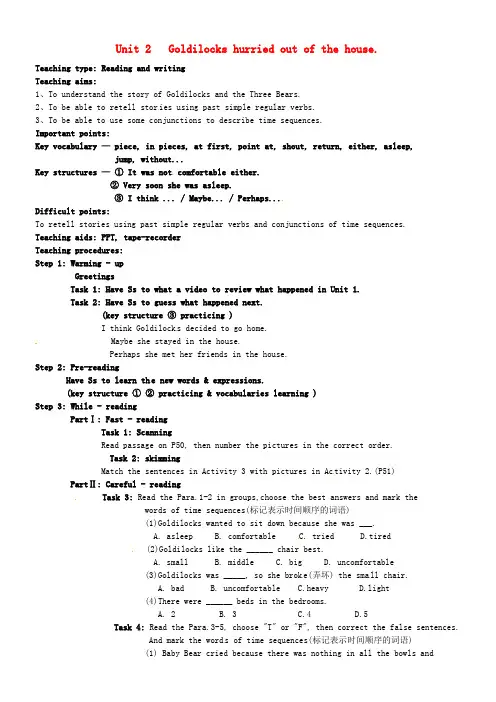
Unit 2 Goldilocks hurried out of the house.Teaching type: Reading and writingTeaching aims:1、To understand the story of Goldilocks and the Three Bears.2、To be able to retell stor ies using past simple regular verbs.3、To be able to use some conjunctions to describe time sequences.Important points:Key vocabulary — piece, in pieces, at first, point at, shout, return, either, asleep,jump, without...Key structures —① It was not comfortable either.② Very soon she was asleep.③ I think ... / Maybe... / Perhaps...Difficult points:To retell stories using past simple regular verbs and conjunctions of time sequences.Teaching aids: PPT, tape-recorderTeaching procedures:Step 1: Warming - upGreetingsTask 1: Have Ss to what a video to review what happened in Unit 1.Task 2: Have Ss to guess what happened next.(key structure ③ practicing )I think Goldilock s decided to go home.Maybe she stayed in the house.Perhaps she met her friends in the house.Step 2: Pre-readingHave Ss to learn th e new words & expressions.(key structure ①② practicing & vocabularies learning )Step 3: While - readingPartⅠ: Fast - readingTask 1: ScanningRead passage on P50, then number the pictures in the correct order.Task 2: skimmingMatch the sentences in Activity 3 with pictures in Ac tivity 2.(P51)PartⅡ: Careful - readingTask 3: Read the Para.1-2 in groups,choose the best answers and mark thewords of time sequences(标记表示时间顺序的词语)(1)Goldilocks wanted to sit down because she was ___.A. asleepB. comfortableC. triedD.tired(2)Goldilocks like the ______ chair best.A. smallB. middleC. bigD. uncomfortable(3)Goldilocks was _____, so she brok e(弄坏) the sma ll chair.A. badB. uncomfortableC.heavyD.light(4)There were ______ beds in the bedrooms.A. 2B. 3C.4D.5Task 4: Read the Para.3-5, choose "T" or "F", then correct the false sentences. And mark the word s of time sequences(标记表示时间顺序的词语)(1) Baby Bear cried because there was nothing in all the bowls andall the chairs were in pieces.(2) The Bears didn't noticed Goldilocks at first.(3) Baby Bear liked Goldilocks.(4) Goldilocks hurried out of the house with her basket.(5) Goldilocks didn't like the Thr ee Bears.Step 4: Post - reading.Have Ss to work with their partners & Try to retell the story.Step 5: SummaryKey vocabulary — piece, in pieces, at first, point at, shout, return, either, asleep,jump, without...Key structures —① It was not comfortable either.② Very soon she was asleep.③ I think ... / Maybe... / Perhaps...Ability: To retell stories using past simple regular verbs and conjunctions of time sequences. Step 6: Homework1、Finish Activity 4&5 on P51.2、Recite the Paragraph 4&5.。
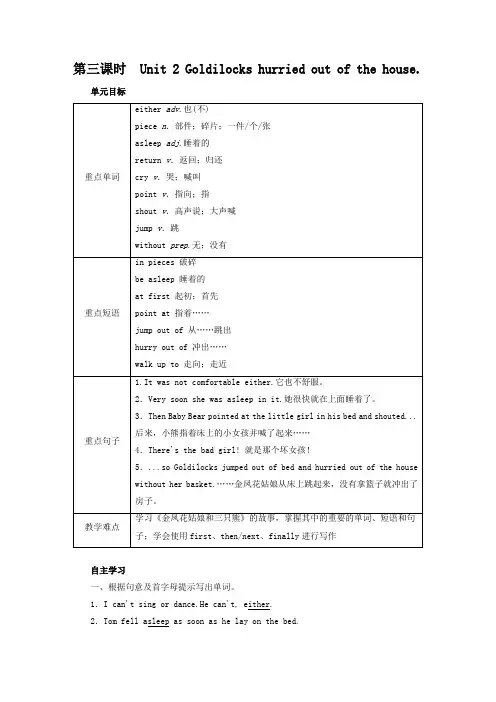
第三课时Unit 2 Goldilocks hurried out of the house.单元目标自主学习一、根据句意及首字母提示写出单词。
1.I can't sing or dance.He can't, either.2.Tom fell asleep as soon as he lay on the bed.3.Christmas is coming.Tom will return to New York for the family gettogether.4.All the students were sleeping when they heard a man shout “help”.5.He found it difficult to improve his English without the teacher's help.二、写出下列画线短语的汉语意思。
1....but Goldilocks was very heavy and soon the chair was in pieces.破碎2.Then Baby Bear pointed at the little girl in his bed and shouted... 指着……3....so Goldilocks jumped out of bed and hurried out of the house without her basket.从……跳出;冲出……4.They didn't notice Goldilocks at first.起初;首先5.Very soon she was asleep in it.睡着的教学过程环节1 新课导入教师让学生们回忆并用自己的话描述《白雪公主》中白雪公主进入七个小矮人房屋的前后过程,最后抽选几位学生在班上分享。
She went far into the forest.Then she saw a little hut.She opened the door of the hut and went in.In the hut she saw seven little beds.There was a table and on the table there were seven little loaves and seven little glasses...设计意图:让学生们回忆自己熟悉的故事,引起学生的兴趣;此故事与我们将要学习的故事内容相似,可以为后面的学习做铺垫。
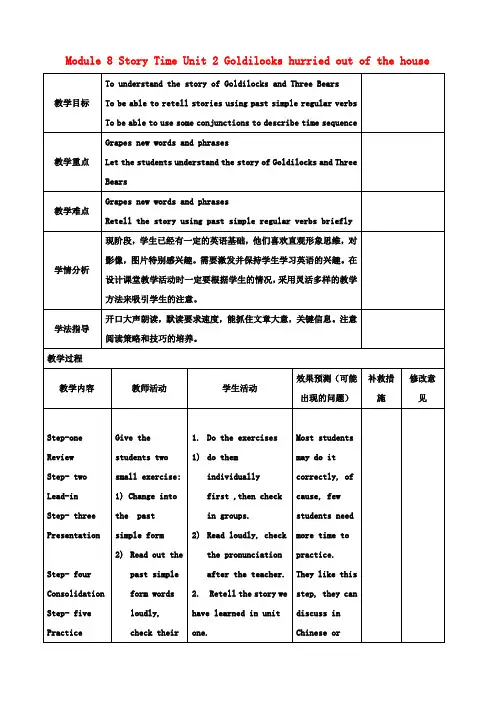
Unit 2 Goldilocks hurried out of the house.Teaching type: Reading and writingTeaching aims:1、To understand the story of Goldilocks and the Three Bears.2、To be able to retell stor ies using past simple regular verbs.3、To be able to use some conjunctions to describe time sequences.Important points:Key vocabulary — piece, in pieces, at first, point at, shout, return, either, asleep, jump, without...Key structures —① It was not comfortable either.② Very soon she was asleep.③ I think ... / Maybe... / Perhaps...Difficult points:To retell stories using past simple regular verbs and conjunctions of time sequences. Teaching aids: PPT, tape-recorderTeaching procedures:Step 1: Warming - upGreetingsTask 1: Have Ss to what a video to review what happened in Unit 1.Task 2: Have Ss to guess what happened next.(key structure ③ practicing )I think Goldilock s decided to go home.Maybe she stayed in the house.Perhaps she met her friends in the house.Step 2: Pre-readingHave Ss to learn th e new words & expressions.(key structure ①② practicing & vocabularies learning )Step 3: While - readingPartⅠ: Fast - readingTask 1: ScanningRead passage on P50, then number the pictures in the correct order.Task 2: skimmingMatch the sentences in Activity 3 with pictures in Ac tivity 2.(P51)PartⅡ: Careful - readingTask 3: Read the Para.1-2 in groups,choose the best answers and mark the words of time sequences(标记表示时间顺序的词语)(1)Goldilocks wanted to sit down because she was ___.A. asleepB. comfortableC. triedD.tired(2)Goldilocks like the ______ chair best.A. smallB. middleC. bigD. uncomfortable(3)Goldilocks was _____, so she brok e(弄坏) the sma ll chair.A. badB. uncomfortableC.heavyD.light(4)There were ______ beds in the bedrooms.A. 2B. 3C.4D.5Task 4: Read the Para.3-5, choose "T" or "F", then correct the falsesentences.And mark the word s of time sequences(标记表示时间顺序的词语) (1) Baby Bear cried because there was nothing in all the bowls andall the chairs were in pieces.(2) The Bears didn't noticed Goldilocks at first.(3) Baby Bear liked Goldilocks.(4) Goldilocks hurried out of the house with her basket.(5) Goldilocks didn't like the Thr ee Bears.Step 4: Post - reading.Have Ss to work with their partners & Try to retell the story.Step 5: SummaryKey vocabulary — piece, in pieces, at first, point at, shout, return, either, asleep, jump, without...Key structures —① It was not comfortable either.② Very soon she was asleep.③ I think ... / Maybe... / Perhaps...Ability: To retell stories using past simple regular verbs and conjunctions of time sequences.Step 6: Homework1、Finish Activity 4&5 on P51.2、Recite the Paragraph 4&5.。
外研版英语七年级下册Module 8Unit 2 Goldilocks hurried out of the house.习题一.用所给词的适当形式填空。
1. My parents__________(marry) fifteen years ago. Now they still love each other.2. Please be__________ (quiet) in the library and read __________ (quiet).3. The naught students__________(stop) talking when their teacher entered the room.4.-When__________ Betty and Lucy__________ (do) their homework last night?-They__________ (do) it at half past seven.5.-Who__________ (destroy) my bike?-Sorry I don’t know.6. When we got home, we found that the door was __________(open).7. It’s exciting__________(see) Chinese spacecrafts in space.8. Yang Liwei was the first Chinese __________ (fly) to space.二.句型转换。
1. I had a nice time last Sunday. (变一般疑问__________ you__________ a nice time last Sunday?2. He did some shopping yesterday. (对画线部分提问)_______ __________he__________ yesterday?3. We stayed at that hotel for two months. (对画线部分提问)__________ __________ __________you__________ at that hotel?4. They arrived here by taxi. (对画线部分提问) __________ __________they__________ here?5. We went to London two years ago. (对画线部分提问) __________ __________you__________ to London?6. His mother spent half an hour at Tianjin Railway Station last Saturday. (对画线部分提问) How long__________ his mother__________ at Tianjin Railway Station last Saturday?三.短语填空。
愉悦的心情是教师的一个极为重要的教育手段,是有效的教育资源。
德育渗透通过体验和分享旅游的快乐,培养对不同文化的兴趣以及热爱生活、积极乐观的生活态度。
核心板书 Unit1 What did you you ?arrive This morning we took a walk. relax I n the evening we had dinner in….. sell-soldtopwonderful“熟知必真知〞,教师理解教材要追求一种陌生化的境界。
Step 1 Warming-up1. Show some pictures of school things. Say what they are.2. Read the words after the teacher.3. Introduce the new words.Step 2 Work in pairs.1. Ask the students to read the places in Activity 1.a ) California b) Hollywood c) Los Angelesd) Pacific Ocean e) Santa Monica f) Disneyland2. Look at the map carefully in Activity 1.3. Ask the students to find the places on the map.4. Play the recording and ask the students to listen to the recording carefully.5. Listen and number the places as you hear them.6. Check their answer with a partner.7. Call back the answer from the whole class and check the answer.Step 3 Listen and read.1. Ask the students to read the conversation silently.2. Play the recording and ask the students to listen and read the conversation.3. Read the conversation.4. Act it out.5. Ask the students to remember the past tense verbs form in the conversation. go —went enjoy —enjoyed do —did take —tookget —got fly —flew meet —met drive —droveis —was stay —stayed see —saw swim —swam6. Learn “Everyday English〞Guess what?Wow!It was great!Step 4 Answer the questions.1. Read the conversation again.2. Now answer the questions.愉悦的心情是教师的一个极为重要的教育手段,是有效的教育资源。
Unit 2 Goldilocks rushed out of the house. 教案一.教学内容:Unit2 Goldilocks hurried out of the house.二.教学目标:1.知识目标:单词:rush, try, destroy, unhappy, asleep, return, cry, point, jump,词组:walk into…, sit down, be asleep, in pieces,in one’s bed, point at…2.能力目标:能读懂简单的故事,明白其中的主要人物、事件以及情节的先后顺序,并能用一些规则动词的过去式叙述简单的事情。
3.情感目标:通过阅读童话故事提高对英语的学习兴趣。
三.教学重难点:会正确运用一般过去时的用法及其句型转换。
四.教学过程:一. 情景导入利用Unit1中的图片,回忆第一单元故事内容,预测故事的发展,激活学生思维,由此导出Unit 2 . Goldilocks rushed out of the house.二. 多层阅读1.泛读:快速阅读,完成Activity 3。
(要求:学生阅读时不能从头到尾、一字不漏地读下去,而是采用跳跃式的默读方法,搜寻相关信息,并对文章的内容有一个总体的了解。
)2.精读仔细默读文章,完成Activity 4。
三.理解意思1.小组内合作解决课文的汉语意思,找出不懂的地方。
2.小组间合作解决不懂的地方,教师适时点拨。
四.突破难点A对重点内容和疑难问题进行合作探究学习。
B 自主完成后,小组合作,交流学习成果,解决不了的可以小组间交流,共同释疑。
C 疯狂朗读以上重点内容。
D 习题巩固。
五.归纳短语1. 先自主归纳文章中的短语,再小组交流补充.本文应当包括以下短语: rush out of, decide to do, walk into…,the other rooms; want to do; sit down,be asleep, in pieces, at first, in one’s bed, point at…, jump out of;return to…, without doing sth; open one’s eyes2.疯狂朗读,听写落实,组长交叉监督。
矿产资源开发利用方案编写内容要求及审查大纲
矿产资源开发利用方案编写内容要求及《矿产资源开发利用方案》审查大纲一、概述
㈠矿区位置、隶属关系和企业性质。
如为改扩建矿山, 应说明矿山现状、
特点及存在的主要问题。
㈡编制依据
(1简述项目前期工作进展情况及与有关方面对项目的意向性协议情况。
(2 列出开发利用方案编制所依据的主要基础性资料的名称。
如经储量管理部门认定的矿区地质勘探报告、选矿试验报告、加工利用试验报告、工程地质初评资料、矿区水文资料和供水资料等。
对改、扩建矿山应有生产实际资料, 如矿山总平面现状图、矿床开拓系统图、采场现状图和主要采选设备清单等。
二、矿产品需求现状和预测
㈠该矿产在国内需求情况和市场供应情况
1、矿产品现状及加工利用趋向。
2、国内近、远期的需求量及主要销向预测。
㈡产品价格分析
1、国内矿产品价格现状。
2、矿产品价格稳定性及变化趋势。
三、矿产资源概况
㈠矿区总体概况
1、矿区总体规划情况。
2、矿区矿产资源概况。
3、该设计与矿区总体开发的关系。
㈡该设计项目的资源概况
1、矿床地质及构造特征。
2、矿床开采技术条件及水文地质条件。